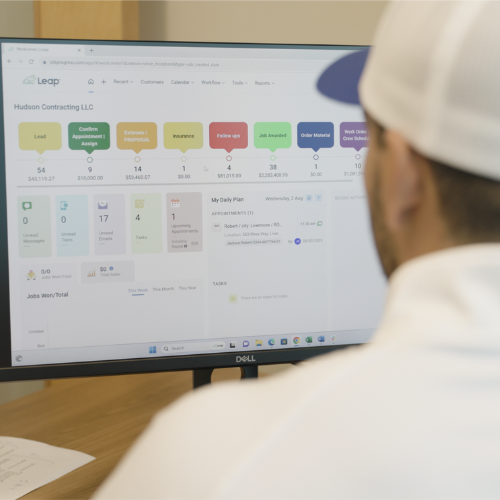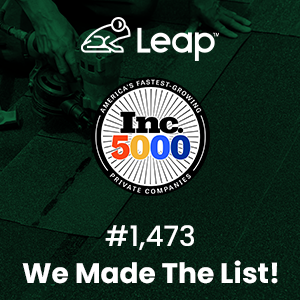Knowing how to estimate a deck job ensures that you offer competitive pricing, cover all expenses, and make a profit. Unfortunately, many contractors struggle with an inconsistent process which often leads to estimating errors that cut into their margins.
In this ultimate guide, we’ll cover the key steps to build a deck estimate accurately. Therefore, your business can streamline the process to win more jobs and satisfy customers.

What is a Deck Estimate?
A deck estimate is a detailed breakdown of the costs associated with building a deck for a homeowner. It includes material costs, labor, overhead, and any additional expenses.
This estimate forms the foundation of your sales proposal to the customer. In fact, a well-prepared estimate demonstrates professionalism and helps build trust.
An accurate deck estimate is important because it impacts both the contractor and the customer. For contractors, it ensures that you cover your expenses and earn a profit. For customers, it provides transparency and confidence in your pricing.
If the estimate is off, it can lead to unexpected costs or unhappy homeowners. Overall, this affects your reputation and profitability.
Moreover, deck estimates play a critical role during the sales process. A detailed estimate can help you close the deal by showcasing your expertise and thoroughness. Customers are more likely to choose contractors who provide clear, professional estimates.
A solid estimate also helps you avoid costly mistakes. Specifically, underestimating costs can eat into your profit. On the other hand, overestimating might scare off potential customers.
A good estimate strikes the right balance for both your business and the homeowner. This ensures a fair price that covers all your expenses and allows for a profit margin.
Key Details to Include in a Deck Estimate
When learning how to estimate a deck job, there are several key details you must include. Each of these factors contributes to the overall cost and helps ensure accuracy.
For example, the key details to include in a deck estimate are:
- Measurements: Breakdown the measurements for the deck job to show the size of the project.
- Material Costs: List all materials you will need for the deck. This includes decking boards, framing lumber, fasteners, and any additional items like railing or stairs. Be specific about the quantity and type of materials.
- Labor Costs: Calculate how many hours the job will take and multiply that by your hourly rate. Consider any specialized labor, such as electrical work for lighting or additional features.
- Permits and Inspections: Don’t forget to include the cost of any necessary permits or inspections. These vary by location.
- Overhead: Calculate your overhead by determining your fixed monthly expenses and indirect costs. Divide that total by the number of jobs you expect to complete in a month to determine the overhead cost per job.
- Contingencies: A contingency is a buffer that accounts for potential issues like weather delays or unforeseen material needs. A 5-10% contingency is common.
- Project Timeline: Including a project timeline in your estimate can help manage customer expectations. Specify how long you expect the job to take and any factors that might affect the schedule.
- Payment Terms: Clarify your payment terms within the estimate. Will you require a deposit before starting the job? Will payments be made in installments or upon completion? Having clear terms helps prevent misunderstandings later.
By including these details in your estimate, you can present a professional and complete proposal. Furthermore, it shows the homeowner that you have considered every aspect of the job and that your pricing is fair.
How to Estimate a Deck Job with Sales Software
Creating accurate estimates manually can be time-consuming and prone to errors. Fortunately, in-home sales software can streamline this process. Estimating software offers several advantages that can help you create precise and professional estimates.
- Speed and Efficiency: Create estimates quickly by automating manual tasks. You can input material prices, labor rates, and overhead costs into the software, which then calculates the total estimate for you. This saves time and reduces the risk of errors.
- Customization: Customize your estimates to match your business. You can create templates for different types of deck projects, including varying materials, layouts, and features. This level of customization ensures that each estimate is tailored to the specific job.
- Accuracy: Improve accuracy by standardizing the way you calculate costs. You can ensure that all the necessary details are included. This reduces the likelihood of missing critical information or miscalculating costs.
- Integration: Many sales software platforms integrate with other tools, such as CRM systems, accounting software, measurement tools, and financing lenders. These integrations allow for seamless operations across your business.
- Professional Presentation: Features for creating professional-looking estimates that you can present to homeowners. These estimates can include your company logo, contact information, and a detailed breakdown of costs. A polished estimate can make a strong impression and increase your chances of winning the job.
- Tracking and Reporting: Track your estimates and generate reports. You can see how many estimates you’ve sent, which ones were accepted, and how your actual costs compared to your estimates. This data can help you refine your estimating process and improve accuracy over time.
Learning how to estimate a deck job without software can impact your efficiency and estimate quality. By automating calculations, integrating with other business tools, and presenting a professional estimate to customers, you can increase your chances of closing the deal.
Optimize Your Estimates with Leap SalesPro
Leap SalesPro can help you optimize your sales process and create accurate estimates quickly. In fact, it’s built by contractors who have been in your shoes and understand the painful processes that hold your business back. That’s why we offer features that streamline the entire sales process, from the initial estimate to the signed contract.
Easily input material costs, labor rates, and other expenses into the software. Leap then does the calculations for you to ensure accuracy. With built-in templates, you can create estimates for different types of deck projects quickly and efficiently.
By using Leap SalesPro, you can minimize errors in your estimates. The software ensures that all necessary details are included, and it automates calculations to reduce the risk of mistakes. This accuracy gives customers confidence in your pricing and helps you avoid costly underselling issues.
Once an estimate is accepted, Leap SalesPro allows you to convert it into a contract with just a few clicks. This streamlines the process and eliminates the need for manual contract creation. Homeowners can review and sign contracts electronically, saving time and reducing paperwork.
As you can see, Leap SalesPro offers customization options that let you create professional-looking estimates and contracts. And creating estimates is just the start. It’s the perfect solution to manage every step of the sales process for you so that you can focus on winning the job.
In conclusion, knowing how to estimate a deck job is essential for every deck contractor. By including all key details in your estimates and leveraging tools like Leap SalesPro to streamline your process, you can build modern estimates that win jobs and ensure profitability. To learn more about the power of Leap SalesPro, fill out the form below and schedule a quick demo.




